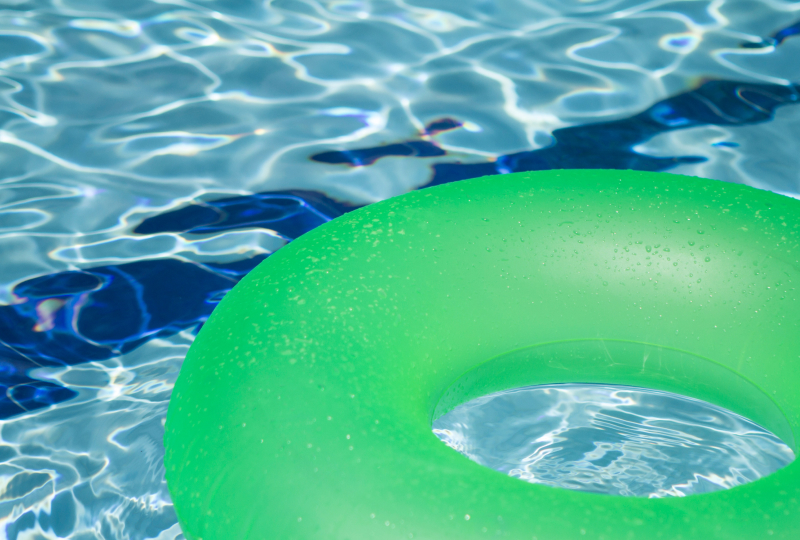
Heating a Swimming Pool
You can use a pool heater to keep your swimming pool water at the ideal temperature. Various pool heating options are available, each with its advantages and disadvantages. The best ways to heat a pool include solar, electric, and natural gas heaters.
Options For Heating A Pool
Solar Pool Heaters
A solar pool heater is an environmentally friendly way to heat your pool. Rather than use electricity or gas, a solar pool heating system harnesses solar energy through solar pool heater panels.
The solar heater transforms the sun’s energy to heat. The heat is used to warm the water in the solar collectors. The solar collector can also be used to lower the pool’s water temperature by filtering the water through the collector at night.
When you buy a solar heater, you can choose between one with an expensive glazed collector system or an unglazed collector system. Glazed collector systems are usually made of copper tubing on an aluminum plate with a tempered iron glass covering. While glazed is a more expensive option, it can capture solar rays more efficiently than unglazed systems.
Overall, the cost of pool solar heating is more affordable than other options, including gas.
Advantages:
- Energy efficient
- Lower pool heating cost
- Reliable
Disadvantages:
- Less efficient in evenings and on overcast days
- Expensive initial cost
- Takes longer to heat the pool water

Electric Heaters for Pools
Electric heaters, also known as heat pumps for pools, are the most common method for heating a pool. This pool heat pump uses electricity to heat the water to reach the desired pool temperature.
An electric heat pump draws outside air in, then circulates it around an evaporator coil. Liquid refrigerant in the coil absorbs the heat and transforms it into a warm gas. The gas then moves through the compressor to increase the heat. As the heat pump brings water into the heating tank, the hot gas transfers its heat to the water.
Advantages:
- Low initial cost
- Reliable
- Versatile; most pool heat pumps have a heater/chiller combo
Disadvantages:
- Not energy efficient
- Can have high operating costs
Natural Gas Heaters
Gas heaters for pools, also called natural gas or propane heaters, use natural gas to warm your pool water.
First, the pool pump moves the water through the pool filter into a combustion chamber pipe. As the water moves through the pipe, it’s heated and pumped back into the pool. Although natural gas heaters warm up your pool water quickly, the cost to heat a pool with gas is more expensive.
Advantages:
- Heats the pool fast
Disadvantages:
- Shorter lifespan than other heaters
- Operating costs for fuel
- Emissions
- Require access to your natural gas line to hook up your gas pool heater
Note: An old propane pool heater will not be as efficient as a new model. We recommend that you upgrade to a new model to reap the benefits.
The Pros And Cons Of Heating A Pool
Before you figure out which heating system to use for your pool, you should decide whether you should even heat your swimming pool in the first place. Contrary to most people’s beliefs, you don’t need to heat your swimming pool unless you want to.
Pros:
- An extended swimming season: Heating your pool ensures comfortable swimming conditions longer, so you can enjoy the water even when the outdoor temperature dips.
- Health benefits: Water that is too cold can shock your system, whereas hot water is better for your health.
Cons:
- Costs: Heating a pool can add significant money to your electricity or gas bill.
- Possible repair: While the best pool heater will last 10-15 years, some may need repair or replacement earlier
Costs Of Heating A Pool
Operating costs depend on two factors: the location of your pool and the type of pool heating system you’re using.
The Location of Your Pool
The location of your pool influences the time and energy it takes to heat it. If your pool is located in a warm climate, you likely won’t have to pay as much to heat your pool as a pool owner in a cold climate.
Additionally, whether you have an indoor or an outdoor swimming pool will influence your heating costs. Indoor pools have the luxury of being in an already-heated building, allowing them to soak up heat from the warm air.
The Type of Pool Heater
The type of pool heater that you use will influence your heating costs.
If you use an electric heater, you can expect to pay more than natural gas or solar. Gas is a more affordable option, but it depends on current gas prices. Overall, solar water heaters are the most affordable option for heating your pool. Since they harness the sun’s energy, you won’t have to worry about heating costs.
The Cheapest Way To Heat A Pool
While it could cost a lot to heat your swimming pool, there are methods that you can use to mitigate costs. Here are some tips that you can use to reduce your heating costs:
- Use a solar pool cover between uses to attract and retain heat
- Choose a pump that is suitable for your pool size (i.e., larger swimming pools will need larger pumps. Pumps that are too small will run longer)
- Use a liquid solar cover to cover the surface area of the water and protect it against evaporation
- Reduce the average temperature of your pool
- Choose a solar power heating system

